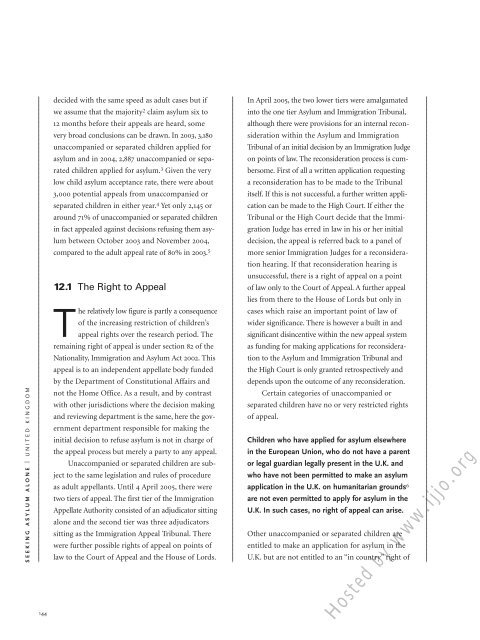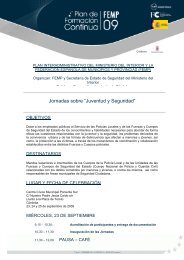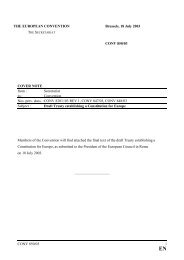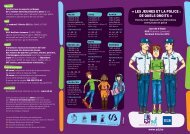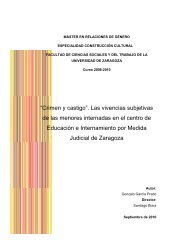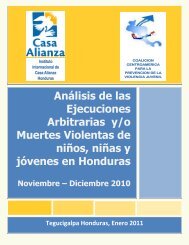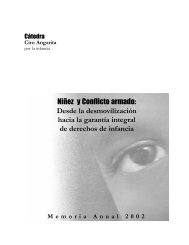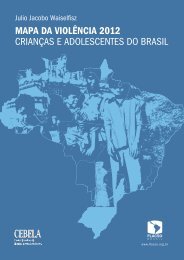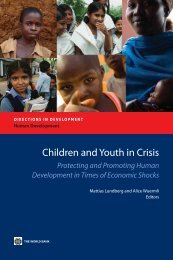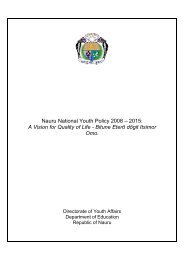Hosted by www.ijjo.org
Hosted by www.ijjo.org
Hosted by www.ijjo.org
You also want an ePaper? Increase the reach of your titles
YUMPU automatically turns print PDFs into web optimized ePapers that Google loves.
SEEKING ASYLUM ALONE | UNITED KINGDOM<br />
144<br />
decided with the same speed as adult cases but if<br />
we assume that the majority 2 claim asylum six to<br />
12 months before their appeals are heard, some<br />
very broad conclusions can be drawn. In 2003, 3,180<br />
unaccompanied or separated children applied for<br />
asylum and in 2004, 2,887 unaccompanied or separated<br />
children applied for asylum. 3 Given the very<br />
low child asylum acceptance rate, there were about<br />
3,000 potential appeals from unaccompanied or<br />
separated children in either year. 4 Yet only 2,145 or<br />
around 71% of unaccompanied or separated children<br />
in fact appealed against decisions refusing them asylum<br />
between October 2003 and November 2004,<br />
compared to the adult appeal rate of 80% in 2003. 5<br />
12.1 The Right to Appeal<br />
The relatively low figure is partly a consequence<br />
of the increasing restriction of children’s<br />
appeal rights over the research period. The<br />
remaining right of appeal is under section 82 of the<br />
Nationality, Immigration and Asylum Act 2002. This<br />
appeal is to an independent appellate body funded<br />
<strong>by</strong> the Department of Constitutional Affairs and<br />
not the Home Office. As a result, and <strong>by</strong> contrast<br />
with other jurisdictions where the decision making<br />
and reviewing department is the same, here the government<br />
department responsible for making the<br />
initial decision to refuse asylum is not in charge of<br />
the appeal process but merely a party to any appeal.<br />
Unaccompanied or separated children are subject<br />
to the same legislation and rules of procedure<br />
as adult appellants. Until 4 April 2005, there were<br />
two tiers of appeal. The first tier of the Immigration<br />
Appellate Authority consisted of an adjudicator sitting<br />
alone and the second tier was three adjudicators<br />
sitting as the Immigration Appeal Tribunal. There<br />
were further possible rights of appeal on points of<br />
law to the Court of Appeal and the House of Lords.<br />
In April 2005, the two lower tiers were amalgamated<br />
into the one tier Asylum and Immigration Tribunal,<br />
although there were provisions for an internal reconsideration<br />
within the Asylum and Immigration<br />
Tribunal of an initial decision <strong>by</strong> an Immigration Judge<br />
on points of law. The reconsideration process is cumbersome.<br />
First of all a written application requesting<br />
a reconsideration has to be made to the Tribunal<br />
itself. If this is not successful, a further written application<br />
can be made to the High Court. If either the<br />
Tribunal or the High Court decide that the Immigration<br />
Judge has erred in law in his or her initial<br />
decision, the appeal is referred back to a panel of<br />
more senior Immigration Judges for a reconsideration<br />
hearing. If that reconsideration hearing is<br />
unsuccessful, there is a right of appeal on a point<br />
of law only to the Court of Appeal. A further appeal<br />
lies from there to the House of Lords but only in<br />
cases which raise an important point of law of<br />
wider significance. There is however a built in and<br />
significant disincentive within the new appeal system<br />
as funding for making applications for reconsideration<br />
to the Asylum and Immigration Tribunal and<br />
the High Court is only granted retrospectively and<br />
depends upon the outcome of any reconsideration.<br />
Certain categories of unaccompanied or<br />
separated children have no or very restricted rights<br />
of appeal.<br />
Children who have applied for asylum elsewhere<br />
in the European Union, who do not have a parent<br />
or legal guardian legally present in the U.K. and<br />
who have not been permitted to make an asylum<br />
application in the U.K. on humanitarian grounds 6<br />
are not even permitted to apply for asylum in the<br />
U.K. In such cases, no right of appeal can arise.<br />
Other unaccompanied or separated children are<br />
entitled to make an application for asylum in the<br />
U.K. but are not entitled to an “in country” right of<br />
<strong>Hosted</strong> <strong>by</strong> <strong>www</strong>.<strong>ijjo</strong>.<strong>org</strong>


